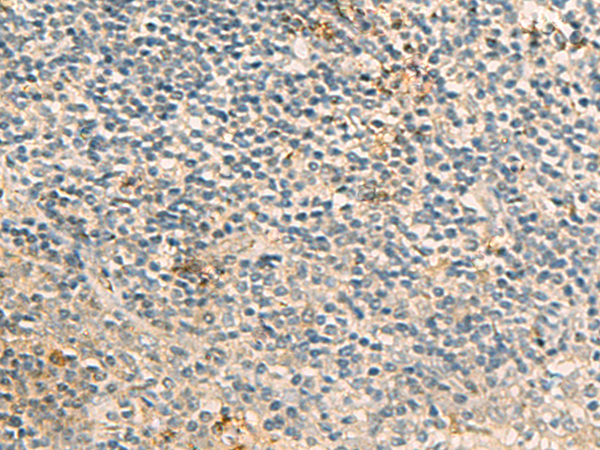
| WB | 咨询技术 | Human,Mouse,Rat |
| IF | 咨询技术 | Human,Mouse,Rat |
| IHC | 1/25-1/50 | Human,Mouse,Rat |
| ICC | 技术咨询 | Human,Mouse,Rat |
| FCM | 咨询技术 | Human,Mouse,Rat |
| Elisa | 1/5000-1/10000 | Human,Mouse,Rat |
| Host/Isotype | Rabbit IgG |
| Antibody Type | Primary antibody |
| Storage | Store at 4°C short term. Aliquot and store at -20°C long term. Avoid freeze/thaw cycles. |
| Species Reactivity | Human, Mouse |
| Immunogen | Synthetic peptide of human FRAT1 |
| Formulation | Purified antibody in PBS with 0.05% sodium azide and 50% glycerol. |
+ +
以下是关于FRAT1抗体的3篇文献概览,涵盖其在癌症和信号通路中的研究应用:
---
1. **文献名称**:*FRAT1. a substrate-specific regulator of β-catenin turnover, is overexpressed in human colorectal cancers*
**作者**:van Es, J.H. et al.
**摘要**:该研究利用FRAT1特异性抗体进行Western blot和免疫组化分析,发现结直肠癌组织中FRAT1表达显著上调,并通过稳定β-catenin增强Wnt信号通路活性,促进肿瘤发生。
---
2. **文献名称**:*FRAT1 promotes the progression and epithelial-mesenchymal transition in hepatocellular carcinoma by regulating PI3K/AKT pathway*
**作者**:Zhang, L. et al.
**摘要**:通过FRAT1抗体检测肝癌临床样本,发现其高表达与患者不良预后相关。研究揭示FRAT1通过激活PI3K/AKT通路促进肿瘤细胞EMT及转移,提示其作为治疗靶点的潜力。
---
3. **文献名称**:*The role of FRAT1 in chemoresistance of gastric cancer cells by modulating DNA damage response*
**作者**:Wang, Y. et al.
**摘要**:该文献采用FRAT1抗体进行免疫荧光和Co-IP实验,证明FRAT1通过抑制ATM/ATR通路降低胃癌细胞对DNA损伤药物的敏感性,其敲除可增强化疗效果。
---
以上研究均通过FRAT1抗体实现蛋白表达检测或机制探索,聚焦其在肿瘤发生、转移及耐药性中的调控作用。如需扩展,可补充发育生物学相关文献(如Cantù等人研究)。
**Background of FRAT1 Antibody**
The FRAT1 (Frequently Rearranged in Advanced T-cell lymphomas 1) gene, also known as GSK-3β-interacting protein, encodes a protein that plays a critical role in the Wnt/β-catenin signaling pathway. Initially identified due to its frequent rearrangement in T-cell lymphomas, FRAT1 functions as a positive regulator of Wnt signaling by binding to glycogen synthase kinase-3β (GSK-3β). This interaction prevents GSK-3β from forming a degradation complex with β-catenin, thereby stabilizing β-catenin and promoting its nuclear translocation to activate target genes involved in cell proliferation, differentiation, and oncogenesis.
FRAT1 antibodies are essential tools for detecting and studying the expression, localization, and function of FRAT1 in both normal and pathological contexts. They are widely used in techniques such as Western blotting, immunohistochemistry (IHC), and immunofluorescence (IF) to investigate FRAT1's role in cancers, particularly those with dysregulated Wnt signaling, such as colorectal, hepatocellular, and breast carcinomas. Additionally, these antibodies aid in exploring FRAT1's involvement in developmental processes and stem cell regulation. Studies also link aberrant FRAT1 expression to chemoresistance and poor prognosis, highlighting its potential as a therapeutic target. Researchers rely on FRAT1 antibodies to dissect molecular mechanisms in disease models and validate experimental findings in clinical samples.
×